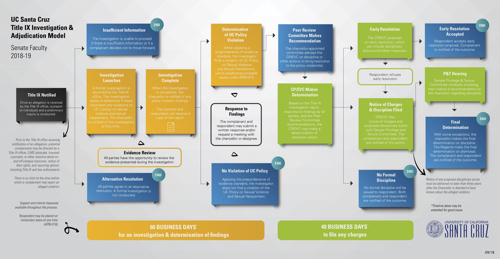Campus News
Frequently asked questions
How long did the investigation take? The process took approximately eight months, which included interviews, evidence review, and more. Through this time, the professor was on leave. We strive to respond to allegations in a timely manner, but some cases do take longer to investigate. This situation involved several complainants and incidents over several years, […]

How long did the investigation take?
The process took approximately eight months, which included interviews, evidence review, and more. Through this time, the professor was on leave. We strive to respond to allegations in a timely manner, but some cases do take longer to investigate. This situation involved several complainants and incidents over several years, which led to a longer timeframe for the investigation.
Allegations against the professor first emerged on or about March 2017 through anonymous graffiti in campus restrooms. However, it was not until people came forward to report their experiences and were willing to participate in an investigation that our Title IX Office was able to initiate an investigation.
What happens now?
The University of California has a clear procedure for responding to allegations of sexual misconduct by tenured faculty. After an investigation has found that the policy was violated, the investigation goes to the chancellor (or designee) who then engages the Peer Review Committee for advise on appropriate outcomes. The chancellor (or designee) also provides the parties an opportunity to express their perspective and desired outcomes. The chancellor (or designee) then makes a decision of how to proceed after reviewing the investigation report, the recommendations from the committee and any response from the parties involved.
From there, a case can go to:
- Early resolution, which can include disciplinary measures, and requires the respondent to accept the terms.
- A disciplinary process
- No formal discipline
If the chancellor (or designee) initiates a disciplinary process, then the chancellor (or designee) files charges with the Academic Senate’s Committee on Privilege and Tenure.
Senate Privilege & Tenure Committee conducts a hearing, then makes a recommendation to the chancellor regarding discipline. The chancellor (or designee) makes the final determination of discipline. The complainant and the respondent are notified of the outcome.
Learn about the process for UC employees and non-tenured academic staff.
Reports involving non-Title IX allegations of misconduct have been provided to the campus provost/executive vice chancellor (CPEVC) for review and action consistent with the policy requirement of CAPM 002.015, which includes forwarding the matter to the Committee on Charges. The Committee on Charges advises the campus provost on a number of issues, which may include a recommendation on proposed discipline.
The CPEVC makes the determination whether to initiate disciplinary action. To initiate such action, the CPEVC issues a notice of charges and proposed discipline to both the faculty respondent and the the Academic Senate Committee on Privilege and Tenure. If the faculty respondent does not accept the disciplinary sanction(s) proposed by the CPEVC, the Committee on Privilege and Tenure will conduct a hearing and make a recommendation to Chancellor Blumenthal in accordance with Academic Senate Bylaw 336.
Is the professor still on leave?
Yes, the professor continues to be on leave.
How will the campus prevent something like this from happening again?
Sexual violence and sexual harassment has no place at UC Santa Cruz. We applaud the bravery of those who are willing to come forward to report incidents and participate in the process and ultimately help make our campus safer for everyone.
We encourage everyone in our community to report sexual misconduct to our Title IX Office.
In addition to implementing policy improvements, UC Santa Cruz launched Beyond Compliance, an ambitious initiative to help change campus culture by engaging faculty members with the goal of creating an environment free from sexual violence and sexual harassment. The initiative last year announced a three-year campaign that focuses on faculty education, participation, and leadership.
The CP/EVC’s office will be hosting a town hall meeting with Title IX, CARE, Beyond Compliance and other partners in mid-October.